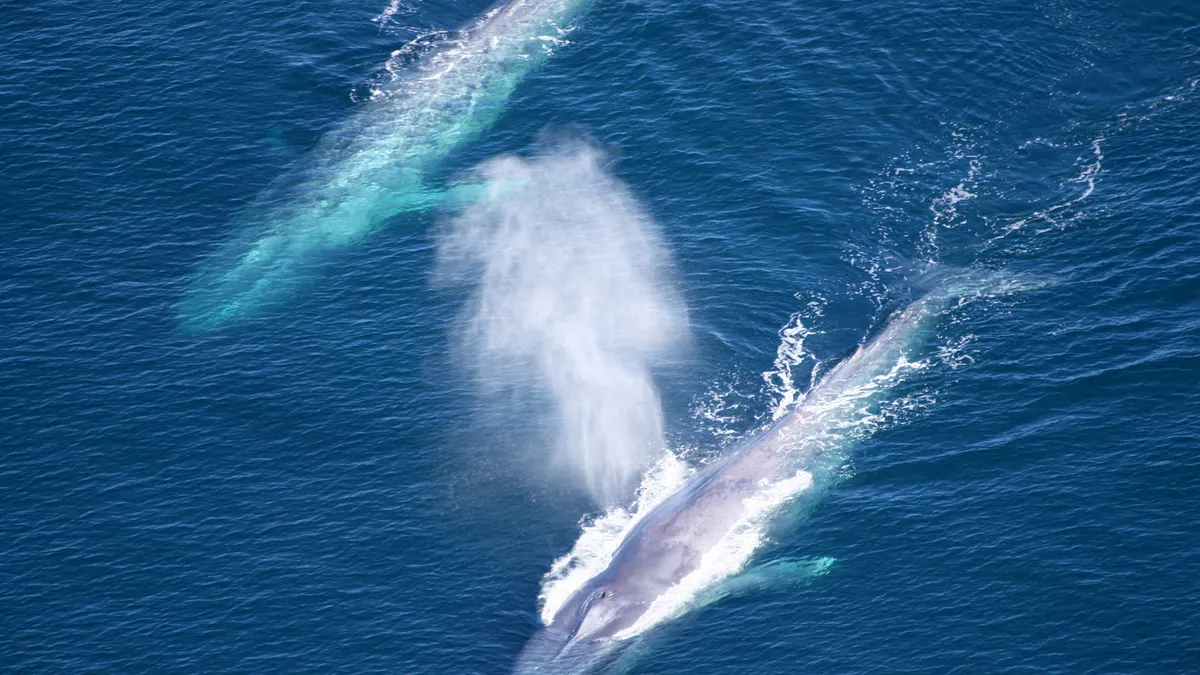Sustainable shipping is a growing interest for consumers, logistics companies, manufacturers, retailers of consumer goods, and cargo owners. This is especially true as climate disclosure regulations are increasing awareness around supply chain impacts. The Protecting Blue Whales and Blue Skies Ambassador Initiative offers a meaningful way to materially reduce maritime shipping’s impact on endangered whales, regional greenhouse gas emissions, and air and noise pollution.
Global shipping companies recognize the key role they play in realizing a safer environment for whales by implementing responsible shipping practices, including reducing speeds in critical whale migratory zones. Reducing risk to whales brings co-benefits of reduced air pollution impacts, regional greenhouse gas emissions, and ocean noise. “Protecting Blue Whales and Blue Skies” is a voluntary vessel speed reduction program that incentivizes shipping companies to reduce speed in critical areas where whales, commerce, and coastal communities overlap.
Ambassadors are product companies, brands, logistics and ports that work with at least one shipping company enrolled in the program, and highlight their participation to help increase program engagement and public awareness.
“Historically, companies that rely on ocean freight have little information about the environmental impacts of the ships carrying their products, and consumers do not have a way to send the signal that whale conservation and supply chain sustainability are important to them,” said Becca Tucker, Blue Whales and Blue Skies director of corporate engagement for the California Marine Sanctuary Foundation.
“The Ambassador Initiative empowers companies with data about their maritime shipping companies’ participation in the Protecting Blue Whales and Blue Skies program and the resulting environmental benefits, as well as empowers consumers to play a role in making change by pushing brands to sign on, or thanking those that do”
Limoneira Company, a 131-year-old international agribusiness headquartered in Santa Paula, California, is the latest company to join the Ambassador initiative.
“Our commitment to sustainability is deeply embedded in our culture, and we view sustainability as a path towards continued long-term success,” said Harold Edwards, President and CEO of Limoneira Company. “We are responsible trustees in the protection and improvement of our environment that align with the goals of the Blue Whales and Blue Skies program.”
Limoneira joins a cohort of trailblazing companies spanning from electronics and consumer goods, to coffee to ports and logistics companies, united by their commitment to ship more sustainability and reduce the biodiversity impacts of their supply chains. Ambassadors include Sonos, the Port of Hueneme, Nomad Goods, Peak Design, Summit Coffee, Way Basics, Santa Cruz Bicycles, Who Gives a Crap, The Block Logistics, and JAS Worldwide.
Each year, shipping companies receive recognition from Protecting Blue Whales and Blue Skies, based on the percentage of distance traveled by their vessels through Vessel Speed Reduction zones at 10 knots or less. The program runs May through mid-December when ground-level ozone (smog) concentrations are high. The 10-knot target reduces the risk of fatal ship strikes to endangered whales, and allows ships to travel at an efficient operating load and use less fuel.
By verifying voluntary cooperation down to the ship and specific transit or the company’s entire fleet of ships, calculating the associated environmental benefits, and recognizing program participants, the program helps global shipping companies better understand their impacts on the environment and make changes to reduce those impacts.
In 2023, cooperating shipping companies realized a 58% reduction in the risk of lethal ship strikes to whales, and an average decrease in underwater noise of 5.4 decibels per transit. Since the program launched in 2014, cooperating vessels have slowed down for more than 1,100,000 nautical miles, resulting in reductions of more than 150,000 metric tons of regional greenhouse gasses and over 4,500 tons of NOx emissions.
When a company signs on as an Ambassador, they receive environmental data identifying the performance and associated environmental benefits of their ocean carriers’ participation in the program. This data can be used to demonstrate their sustainability commitments to customers and stakeholders, and to facilitate more sustainable shipping choices in the future.
The Protecting Blue Whales and Blue Skies program is a collaborative effort by air pollution control districts, California national marine sanctuaries, the California Marine Sanctuary Foundation, and other non-profit organizations.
To become an Ambassador, send inquiries to [email protected] and [email protected]g.
For more information visit https://www.bluewhalesblueskies.org/










